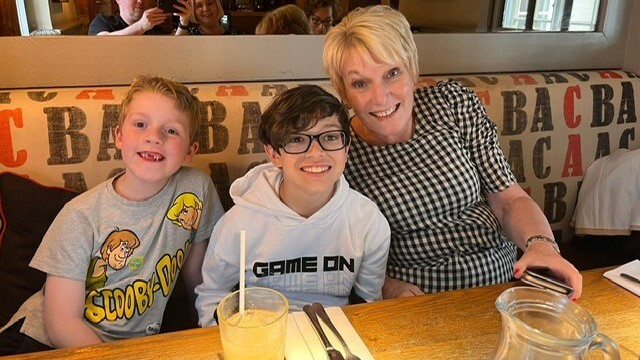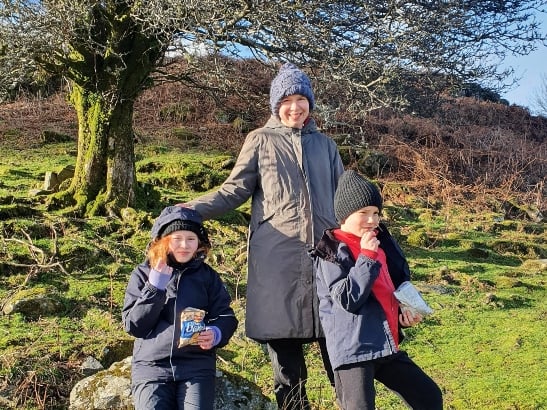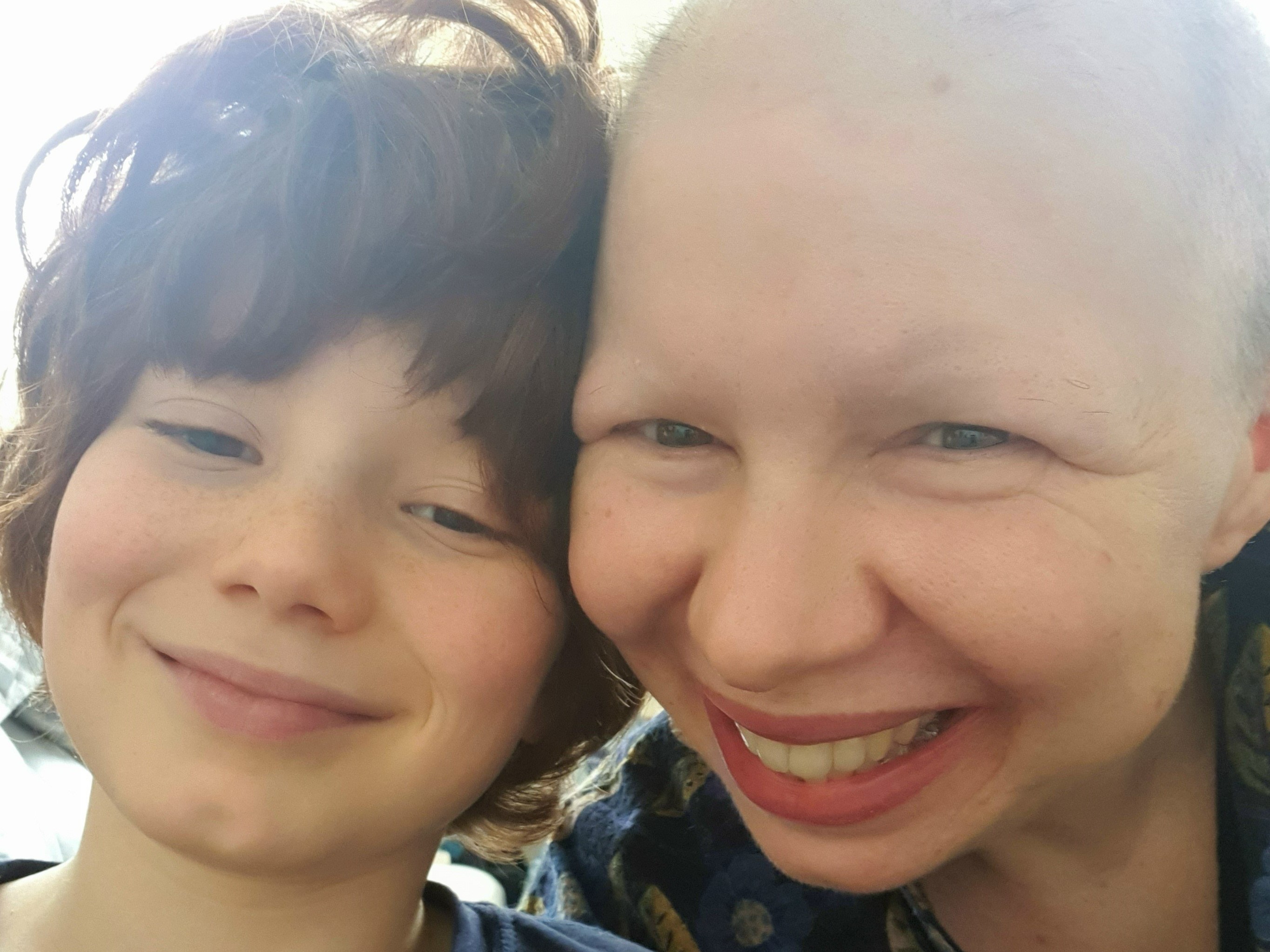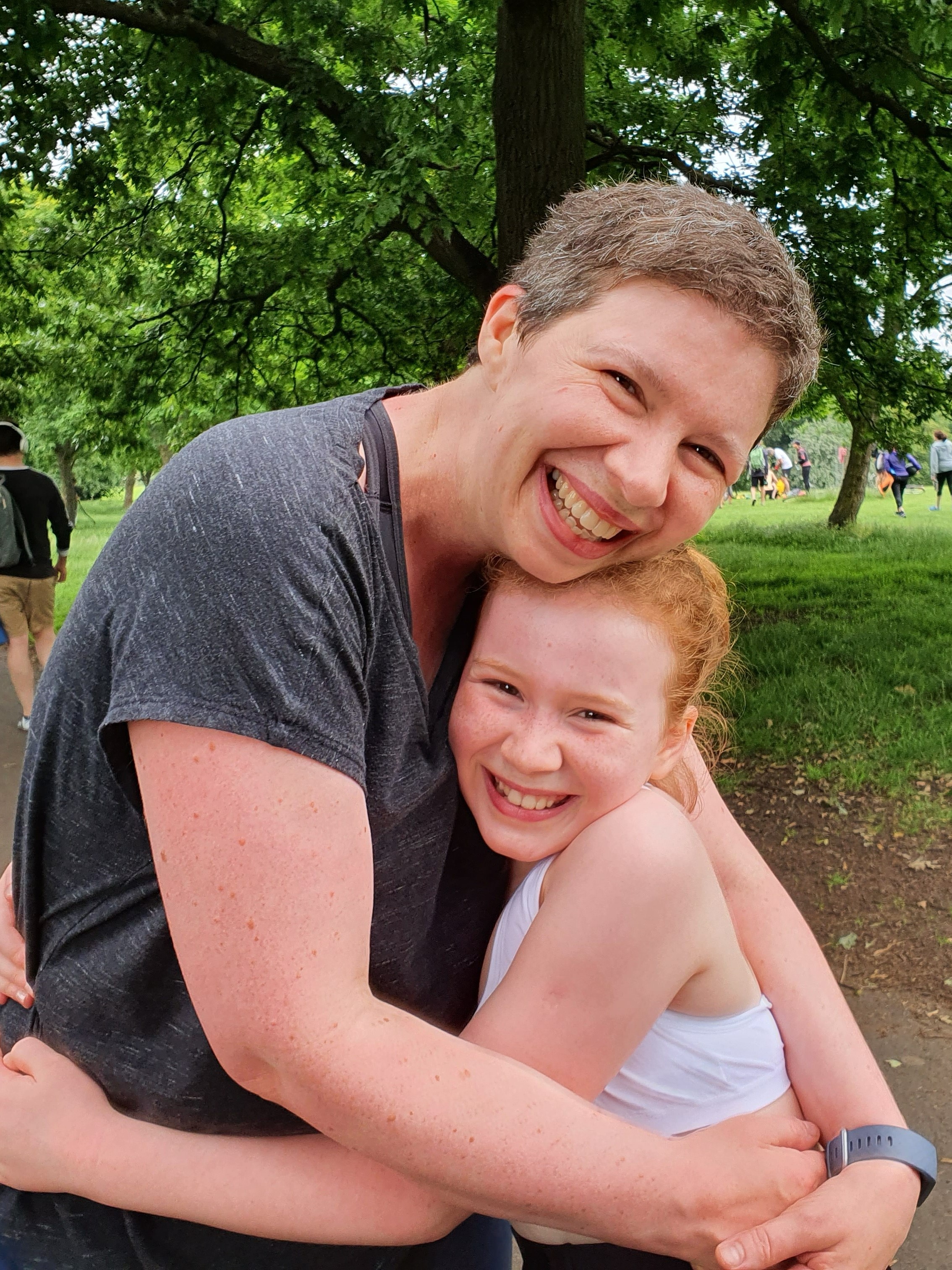
Image: Sue Vincent with her grandchildren. Credit: Sue Vincent
In the decades since, painstaking scientific research into the underlying biology of these cancers – much of which took place in our labs here at the ICR – uncovered their Achilles heel and led to the development of a precision drug called olaparib.
Today, olaparib is an effective treatment for many people with cancers linked to inherited BRCA1 and BRCA2 genes.
Here patients share how the drug has impacted their lives.

Image: Annie with her children in the Lake District. Credit: Annie Baker
‘It’s given me so much reassurance and hope’
Annie Baker, 42, lives in Brockley, London, with her husband, Phil, 12-year-old daughter, Lizzie, and ten-year-old son, Patrick. She was diagnosed with early-stage breast cancer in July 2020 and was treated with chemotherapy after tests showed the cancer had spread to her lymph nodes.
During her treatment, she found out she had a mutation in her BRCA2 gene.
“I had a mastectomy in February 2021. There was still some cancer in the lymph nodes, so I went in for another surgery and after that no further cancer was found. Then I had radiotherapy and started on hormone treatment.”
Treating breast cancer when it is caught early is highly effective, and most people will remain cancer-free long term. But people with inherited BRCA1 or BRCA2 mutations have a greater risk of seeing their cancer come back.

Image: Annie with her son. Credit: Annie Baker
Precision treatment
For these patients, olaparib offers an additional precision treatment that targets mutations in BRCA1 and BRCA2 to help prevent their cancer returning.
“I was aware of olaparib,” she says, “and the OlympiA clinical trials, and was able to be part of AstraZeneca’s Early Access Programme.”
“I started taking olaparib at the end of September 2021. I took it as tablets twice a day for twelve four-week cycles. And I felt a little queasy and tired sometimes, but my normal life continued. It was a sharp contrast to the chemo, which was really tricky and I lost my hair, or with the surgery which was life-changing.
“I took olaparib for a year and during that treatment I worked full-time, completed a 10k, was a mum to my children and basically my normal self.
“And the amazing thing is that it’s reduced my risk of the cancer coming back by a third for people with my circumstances, with the early staging and BRCA mutation. It’s incredible that I’ve been able to take this treatment while living and working as normal and it’s made such a huge change to my prognosis.
“Telling my children about my breast cancer was the hardest thing I ever had to do…and olaparib has really reduced the chances I will ever have to do that again. It has given me so much reassurance and hope.”

Image: Annie and her daughter. Credit: Annie Baker
Our pioneering drug discovery research is transforming the lives of cancer patients across the world, helping them live longer and better. Please donate today to help us find tomorrow's cancer treatments and help more people survive cancer.
'Olaparib has given me my life back'
When Sue Vincent learned in 2010 that her ovarian cancer had spread to three different parts of her body and was inoperable, she resigned herself to having only months to live. But then she was offered a place on a clinical trial for olaparib.
Thirteen years on, Sue is still taking the drug, and explains how the work of our scientists has given her a quality of life she could only have dreamed about.
“In 2007 I was diagnosed with advanced ovarian cancer. At the time I was 54, had just started a new relationship, was in a full-time job as a local government officer and went to the gym two or three times a week.
“My own mum had been diagnosed with breast cancer in 1968 when I was 16. At the time she was told it wasn’t hereditary. But after my own diagnosis I went for genetic testing and was found to have a mutation in my BRCA2 gene.
“In 2010 I had a double mastectomy as a precaution because of the gene mutation. A few months later – three years after my first diagnosis – I was told the cancer had returned. This time it was in three places and inoperable.
Trial of a pioneering new treatment
“My consultant talked to me about the opportunity to go on a clinical trial for a pioneering drug called olaparib.
“My view was that as my prognosis wasn’t particularly good, anything that could enable me to have longer had to be a good thing. I also felt that if I was going to die then I wanted the medical profession to be able to learn from me because of my BRCA mutation. I had two daughters, and I didn’t want them to go through what I was going through.
.jpg?sfvrsn=34415b70_2)
Image: Sue with her baby granddaughter. Credit: Sue Vincent
“So, for the past 12 years I have been taking olaparib and it has given me my life back. It has enabled me to see five beautiful grandchildren being born and to take an active part in their life. It has enabled me to go back to work and build a significant business for myself. I’ve even been awarded an MBE for my work in local government, supporting people with disabilities.
“I’m back doing all the things I did pre-diagnosis. It’s given me a quality of life I could only have dreamed about. My prognosis was so dire that really and truthfully any life was going to be good. This life is very, very good."
“Thanks to the funding and the sheer excellence of scientists and researchers I’m here to tell the tale and I've never stopped feeling grateful.
“I was in the right place at the right time and extremely lucky to be offered that trial and I have had an amazing 12 years so far as a result of that. The sheer dedication of everyone who works in cancer research is amazing.”